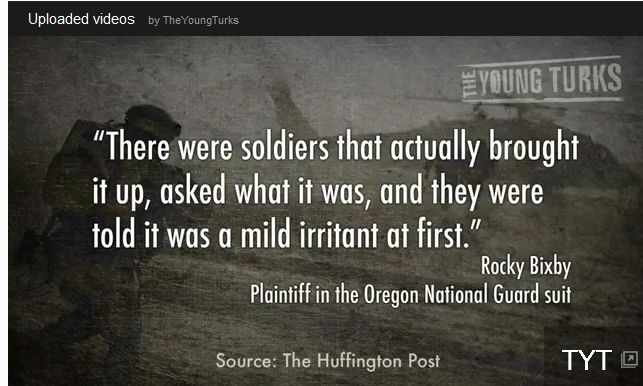It looks like you're using an Ad Blocker.
Please white-list or disable AboveTopSecret.com in your ad-blocking tool.
Thank you.
Some features of ATS will be disabled while you continue to use an ad-blocker.
6
share:

WASHINGTON -- Sodium dichromate is an orange-yellowish substance containing hexavalent chromium, an anti-corrosion chemical. To Lt. Col. James Gentry of the Indiana National Guard, who was stationed at the Qarmat Ali water treatment center in Iraq just after the 2003 U.S. invasion, it was “just different-colored sand.” In their first few months at the base, soldiers were told by KBR contractors running the facility the substance was no worse than a mild irritant.
Gentry was one of approximately 830 service members, including active-duty soldiers and members of the National Guard and reserve units from Indiana, South Carolina, West Virginia and Oregon, assigned to secure the water treatment plant, according to the Department of Veterans Affairs.
Sodium dichromate is not a mild irritant. It is an extreme carcinogen. In November 2009, at age 52, Gentry died of cancer. The VA affirmed two months later that his death was service-related.
In November, a jury found KBR, the military's largest contractor, guilty of negligence in the poisoning of a dozen soldiers, and ordered the company to pay $85 million in damages. Jurors found KBR knew both of the presence and toxicity of the chemical. Other lawsuits against KBR are pending.
KBR, however, says taxpayers should be on the hook for the verdict, as well as more than $15 million the company has spent in its failed legal defense, according to court documents and attorneys involved with the case.
KBR's contract with the U.S. to rebuild Iraq’s oil infrastructure after the 2003 invasion includes an indemnity agreement protecting the company from legal liability, KBR claims in court filings. That agreement, KBR insists, means the federal government must pay the company's legal expenses plus the verdict won by 12 members of the Oregon National Guard who were exposed to the toxin at the Qarmat Ali water treatment plant.
The military disagrees. A U.S. Army Corps of Engineers contracting officer told KBR in November 2011 that litigation costs "are not covered by the indemnity agreement.
“What KBR received -- and Oregon soldiers and the American taxpayers may be stuck paying for -- is a get out of jail free card that no one outside of the Pentagon had any say in giving them,” Wyden said in a statement last month. “Thanks to that plum deal, KBR could be let off the hook after negligently exposing Oregon service members to toxic chemicals. Some indemnification agreements are justified, but many are not, and the Pentagon should have to justify these agreements to Congress.”
www.huffingtonpost.com...
So tax payers will probably foot the bill for some corrupt Cheney connected corporation.........
Don't really understand how a contract could possibly include legal fees if sued but wouldn't surprise me if it did include such a thing.
No replies? Really? I found if to be a rather important story. I guess since it makes the republican party look bad no one cares.
I would think that maybe your main concern would be more for the soldiers and the company, rather then trying to make a hit piece on Cheney......
I mean i dont like him either but...........hes the least of my concerns in a situation like this.......
Whats more concerning is the people exposed and taking care of them........and making sure the company is held accountable
Not some witch hunt thats not going to do any good........
I mean i dont like him either but...........hes the least of my concerns in a situation like this.......
Whats more concerning is the people exposed and taking care of them........and making sure the company is held accountable
Not some witch hunt thats not going to do any good........
reply to post by ManBehindTheMask
You make no sense.
Hit piece on Cheney? That was the title of the video. I followed ATS rules by copy and pasting it...
You wouldn't have had said anything if it were about Obama.
Cheney was part of the company. It was a subsidiary of Haliburton......... That's the whole reason the company got the contract in Iraq. The company being in Iraq is where the soldiers were posioned. He is a vital part of the story.
If you don't like talking about corruption, why are you on ATS?
You make no sense.
Hit piece on Cheney? That was the title of the video. I followed ATS rules by copy and pasting it...
You wouldn't have had said anything if it were about Obama.
the soldiers and the company, rather then trying to make a hit piece on Cheney......
Cheney was part of the company. It was a subsidiary of Haliburton......... That's the whole reason the company got the contract in Iraq. The company being in Iraq is where the soldiers were posioned. He is a vital part of the story.
If you don't like talking about corruption, why are you on ATS?
edit on 14-1-2013 by WaterBottle because: (no reason given)
edit on 14-1-2013 by WaterBottle because: (no reason
given)
new topics
-
Ed Dowd some good news
Medical Issues & Conspiracies: 7 hours ago -
Anyone like the Scorpions?
Music: 7 hours ago -
What if this is true?
2024 Elections: 8 hours ago -
Merry-Go-Round Ride
Short Stories: 10 hours ago
top topics
-
A fix for the Trans players in sports
Social Issues and Civil Unrest: 17 hours ago, 16 flags -
What if this is true?
2024 Elections: 8 hours ago, 13 flags -
Man Stabbed or Cardiac arrest on Westminster Bridge, London, UK
Mainstream News: 15 hours ago, 7 flags -
It's toast
General Chit Chat: 14 hours ago, 7 flags -
Ed Dowd some good news
Medical Issues & Conspiracies: 7 hours ago, 6 flags -
Merry-Go-Round Ride
Short Stories: 10 hours ago, 5 flags -
Anyone like the Scorpions?
Music: 7 hours ago, 3 flags
6
